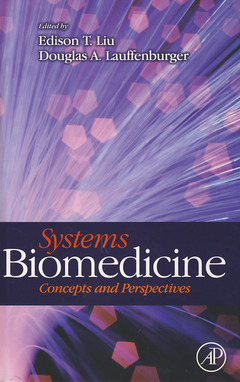Description
Systems Biomedicine
Concepts and Perspectives
Coordinators: Liu Edison T., Lauffenburger Douglas A.
Language: English
Subjects for Systems Biomedicine:
448 p. · 15x22.8 cm · Hardback
Out of Print
Description
/li>Contents
/li>Readership
/li>Comment
/li>
Systems biology is a critical emerging field that quantifies and annotates the complexity of biological systems in order to construct algorithmic models to predict outcomes from component input. Applications in medicine are revolutionizing our understanding of biological processes and systems.
Systems Biomedicine is organized around foundations, computational modeling, network biology, and integrative biology, with the extension of examples from human biology and pharmacology, to focus on the applications of systems approaches to medical problems. An integrative approach to the underlying genomic, proteomic, and computational biology principles provides researchers with guidance in the use of qualitative systems and hypothesis generators. To reflect the highly interdisciplinary nature of the field, careful detail has been extended to ensure explanations of complex mathematical and biological principles are clear with minimum technical jargon.
Genomic Technologies for Systems Biology
Proteomic Technologies
II. Computational Modeling of Biological Systems
Dynamic Systems Analysis
Spatio-temoral Modeling of Cellular Systems
High-level modeling of biological networks
High-Performance Computing
Modeling Software
III. Network Biology
Protein Interaction Networks
Signaling Networks with Modeling Strategies
Protein networks in integrin-mediated adhesions
Network Imaging
RNAi networks
IV. Integrative Biology of Higher Biosystems
Signal Processing and Integration During Development
Systems Biology and Stem Cell Biology
Application of immunologic modeling in drug discovery and development
V. Systems Medicine Applications
Systems Pharmacology
- Organized to reflect the important distinguishing characteristics of systems strategies in experimental biology and medicine
- Provides precise and comprehensive measurement tools for constructing a model of the system and tools for defining complexity as an experimental dependent variable
- Includes a thorough discussion of the applications of quantitative principles to biomedical problems
These books may interest you

Proteomics and Systems Biology 166.19 €



